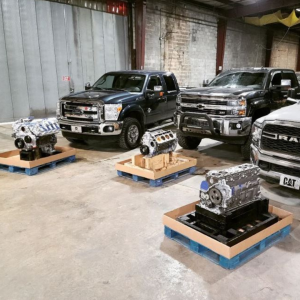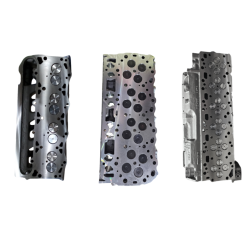What Are the Major Advantages of Diesel Engines?
There are a lot of different types of engines out there today. From gasoline to electric, there are many reasons people prefer one type over the other. Diesel engines have been the backbone of the heavy-duty trucking industry for years. It is no wonder that they are popular among truck drivers and mechanics.
However, diesel engines are not just limited to trucks. They come in a range of sizes and can be found powering everything from boats to generators to portable transportable generators.
Diesel engines provide quite an impressive list of benefits as compared to their gasoline counterparts, which makes them a worthwhile investment for any driver or mechanic looking for an engine upgrade. Let’s take a look at some of these benefits and see if you agree with them!

Diesel engines are powerful
One of the main reasons why diesel engines are so popular is because they are extremely powerful. As a matter of fact, diesel engines are about 30% more powerful than gasoline engines for the same engine displacement.
The average diesel engine is able to produce about 20% more horsepower than a similarly sized gasoline engine. A gasoline engine may produce, say, 350 horsepower, but a diesel engine can produce 400 horsepower or even more with the same amount of fuel.
The main reason why diesel engines are more powerful than gasoline engines is because of their compression ratio. The compression ratio is the ratio of the volume of a cylinder when the piston is at the bottom of its stroke and the volume of a cylinder when the piston is at the top of its stroke. The higher the compression ratio, the higher the amount of power the engine can produce.
Diesel engines have a higher compression ratio than gasoline engines, which results in increased power.
Diesel engines are fuel-efficient
Another key advantage of diesel engines is that they are fuel-efficient. Gasoline engines require a much greater amount of fuel to achieve the same performance as a diesel engine.
The US Department of Energy estimates that a gasoline engine with a four-cylinder capacity and 1500 lb-ft torque will require about 1 gallon (4 liters) per hour for 1000 hours running time, whereas a comparable diesel engine would only need about 0.4 gallons (1 liter) for the same amount of time.
This difference is even more drastic when you look at larger engines. A gasoline-powered one with an 8 cylinder capacity and 18000 lb-ft torque will require over 3 gallons (12 liters) per hour for 1000 hours running time, whereas a comparable diesel engine would only need about 1 gallon (4 liters).
Even though diesel fuel has traditionally been more expensive than gasoline, it is becoming increasingly competitive in recent years. The increase in demand for biodiesel has also driven down the cost and increased its availability.
Diesel engines last longer than gasoline engines
Diesel engines are more durable than gasoline engines. They can last about 15% longer before repairs need to be made. Diesel engines also need to be replaced less often. This is due to their ability to withstand higher temperatures and pressures than a gasoline engine.
This means that you won’t have to worry about your engine giving out as often, which will allow you to use it for all of the heavy-duty tasks that you’ve been putting off because of an old engine.
Diesel engines are typically heavier and more durable than gasoline engines which makes them ideal for truck drivers who need something that can withstand hours of heavy use on the road.
Diesel engines use less space and weight
One of the major advantages of diesel engines is that they use less space and weight. This is a big deal when you are talking about the engine in a truck. Taking up less space means that there is more room for cargo and it also means that the truck will be able to haul more than just its own weight.
Diesel engines have the highest effective efficiency of all combustion engines
Gasoline engines are the most commonly used engine in the United States. They operate on the Otto cycle and use about 30-40% of their fuel for power. Diesel engines, on the other hand, operate on a different combustion process known as the diesel cycle.
The diesel engine operates at a higher compression ratio and generates more heat per unit of air than a gasoline engine. This is because it compresses air to a higher degree before introducing it to fuel. As a result, diesel engines can convert up to 50-60% of their fuel into power.
Diesel engines can combust a huge variety of fuels
Another big advantage of diesel engines is the fact that they can combust a huge variety of fuels, including fuels such as oil which have advantages over traditional fuels.
These advantages include:
- Low costs because they use cheap fuel oils
- Good lubrication properties
- High energy density
- and low risk of fire because they do not form an ignitable vapor.
Biodiesel is the most easily synthesized non-petroleum-based fuel that can run directly in many diesel engines. Gasoline-powered engines either need adaptations to be able to accept synthetic fuels or else will require them as additives for gasoline (such as when ethanol is added).
Diesel engines have a very good exhaust-emission behavior
Diesel engines have a very good exhaust-emission behavior. The fuel burns more efficiently, which results in minimal amounts of carbon monoxide and hydrocarbons in the exhaust.
Direct-injected diesel engines emit approximately as much nitrogen oxides as Otto cycle engines; however, precombustion chamber or swirl chamber injected diesel emit half that amount when running under full load compared to Otto cycle engine emissions (without using any after treatment).
Diesel engine emissions also contain one-tenth the pollutants and “less” carbon dioxide than an equivalent Otto-cycle engine running at full capacity. (comparing raw emission figures without gas cleaning process)
Diesel engines have no high voltage electrical ignition system
The high voltage electrical ignition system in a gasoline engine is responsible for the spark in order to ignite the fuel. This creates a problem because anytime something disrupts that system, the engine will stall and could even shut off on you.
Diesel engines do not have this ignition system and are instead powered by compression. Diesel engines rely on pressurized air through a nozzle that ignites fuel mixed with air to create combustion.
Diesel engines can accept super- or turbocharging pressure without any natural limit
Another major benefit of installing a diesel engine is that it can accept super- or turbocharging pressure without any natural limit. This is unlike regular gasoline engines, which will inevitably suffer detonation at high pressure if tuning and/or fuel octane adjustments are not made to compensate for the increased pressure.
This means that you are able to push the pressure on your engine to the max and not worry about it blowing up in your face.
A Final Word on the Advantages of Diesel Engines
Diesel engines are a type of internal combustion engine that uses diesel as a fuel. They are generally more powerful and efficient than gasoline engines and can use a wide variety of fuels.
Diesel engines are often described as the technology of the future. This is because diesel engines are clean, efficient, and powerful. They have a variety of environmental benefits too. For example, they have no high voltage ignition system and therefore emit less electromagnetic interference. This means they can be used near sensitive equipment, like hospitals.
Diesel engines are also known as “cleaner” engines because they burn cleaner than gasoline. Diesel exhaust typically contains much lower levels of nitric oxides, carbon monoxide, and particulates – all things that can negatively affect both people’s health and the environment around them.






